






































































Rochester 101

Editor’s note Short cuts

The lowdown on higher ed

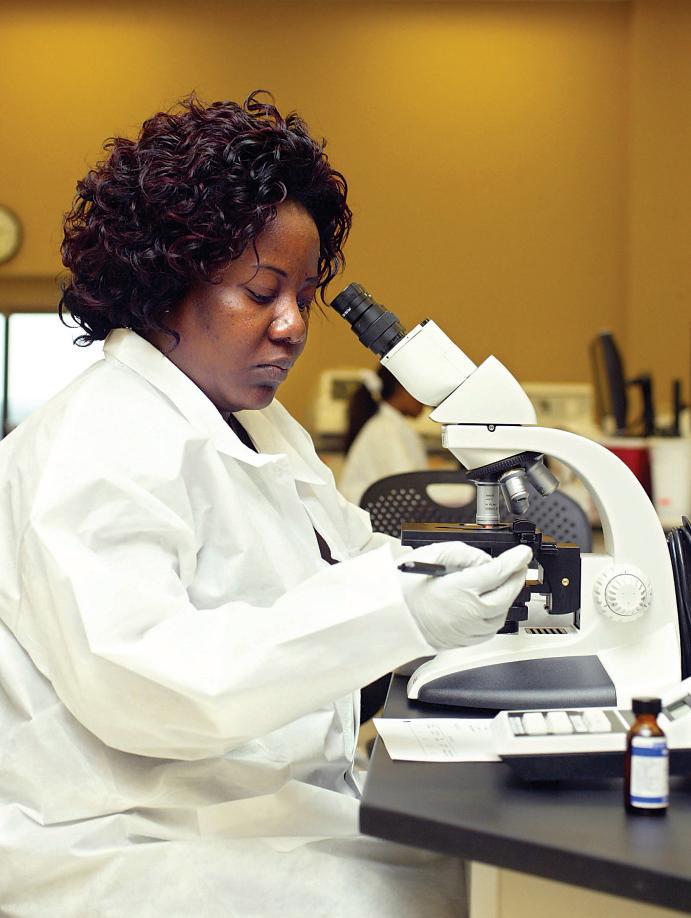
Clothes minded
Scene about town Ten (or so) questions

On back-to-back days last month, while on an East Coast motorcycle trip with my dad and little sister, we experienced the following:
On Thursday, we watched a mother humpback and her calf swim alongside our whale watching tour boat for 45 minutes.
On Friday, we saw a bear ride a Segway.
Not some guy in a bear suit. An actual bear. Riding a two-wheeled personal transportation device that recently starred in Paul Blart: Mall Cop (see page 14).
“Less than one percent of all humans,” according to the whale tours website, “have ever seen a whale in its natural habitat.”
We couldn’t find any statistics about the number of humans who have seen a bear ride a Segway. The odds of seeing these two things happen on consecutive days are—and we’re quoting a statistician friend here—“What in the hell are you talking about? What do you mean, a bear riding a Segway? Like one of those stand-up things with wheels? And do you mean a guy in a bear suit?”
The whale watching took place in the Atlantic Ocean, a dozen or so miles offshore from Gloucester, Mass.
The bear-on-a-Segway was just one scripted bit from the Bear Show at Clark’s Trading Post in New Hampshire, one of those one-of-a-kind, classic roadside attractions from America’s Golden Age of Tourism. Other bits included a game of “bears”ketball and something about the right to “bear arms” and a reference to the trainer and his “bear behind.”
Sure, wild whales and balancing bears are relatively interesting, and seen by relatively few humans. But I have also personally met Mr. Crispy, a celery-headed mascot at a celery interpretive museum. I’ve been attached to a Psycograph—an antique phrenology machine designed to read a person’s head bumps and depressions to determine personality—at the Museum of Questionable Medical Devices. I’ve seen—but turned down the tour guide’s offer to handle—a collection of historical contraceptive devices (that looked like something out of a tackle box) at the History of Contraception Museum. It may sound braggy, but it’s really a cry for help.
I’ve never passed a Mustard Museum (“See 5,000 jars of mustard from 50 states!” in Mt. Horeb, Wis.) or a Vinegar Museum (“See vinegars from all over the world!” in Roslyn, S.D.) or an Ed’s Museum (“See Ed’s gallstones in a glass jar!” in Wykoff, Minn.) that didn’t lure me in to spend anywhere from “donations accepted” to $10 to tour.
At the Celery Interpretive Center in Portage, Mich., our tour started with a question. “Celery,” asked our tour guide, pausing dramatically, “just a crunchy green vegetable?” The question was rhetorical. And the answer was no. Hell no. On the tour, we witnessed celerying tools, a roll of celery tape (used for “binding stalks for shipping”), and a poster touting Dunkley’s Kalamazoo Celerytone (a “celery tonic aphrodisiac,” containing “20 percent alcohol”). That’s where we met Mr. Crispy.
At the Postal Museum, in Marshall, Mich., we stepped into a room designed to look like the inside of an old train car, and we stood in front of a table stacked with envelopes that needed to be sorted. “Squint your eyes,” said our postal-hatted tour guide, “and just pretend.” We were pretending, it turned out, to be postal workers sorting mail on one of these trains.
It should be noted that, when I visited Toronto’s History of Contraception Museum (a half dozen or so display cases in a hallway of a large pharmaceutical company), it was for a magazine story. Though I should have told the tour guide, who probably found my furious notebook scribbling and constant photo-taking a bit disconcerting. Anyway, when I left, the female tour guide, apparently sensing my unbridled interest in the subject, gave me a “special edition” coffee table book with photos of the various displays.
And, really, what are the odds of that?
STEVE LANGE slange@rochestermagazine.com

NOOD REYNOLDS nreynolds@rochestermagazine.com
MEGAN MALUGANI mmalugani@rochestermagazine.com
JAMIE FITZGERALD jfitzgerald@rochestermagazine.com
GERMAINE NEUMANN KRISTY MINTZ (507) 281-7469 kmintz@rochestermagazine.com
VICKY KRUGER (507) 285-7775 vkruger@rochestermagazine.com
CLAIRE LEMPKE ANNA STEVENS
SCOTT JACOBSON MICHELE JOKINEN KEN KLOTZBACH ELIZABETH NIDA JERRY OLSON
POST-BULLETIN COMPANY, L.L.C. 18 FIRST AVENUE S.E. P.O. BOX 6118 ROCHESTER, MINNESOTA 55903-6118 (507) 285-7770
VOLUME TEN NUMBER NINE
Rochester Magazine is a monthly publication produced by the Post-Bulletin Co., L.L.C. and distributed at hotels and on racks throughout Rochester, MN. No part of this publication may be reprinted or otherwise reproduced without written permission. Editorial

correspondence: Editor, Rochester Magazine, 18 First Ave. S.E., P.O. Box 6118, Rochester, MN 55903-6118 or e-mail to SLange@rochestermagazine. com. Comments, additions, or corrections may be sent via e-mail to: SLange@rochestermagazine.com.
Rochester Magazine is available for home delivery ($15 for 12 issues) by calling 507-285-7775 or 866-665-2323.































what’s happening where


Organizers of the Rochester hope to draw 600 walkers and raise $60,000 at this year's event on September 12 at East Silver Lake Park.
The ALS (short for amyotrophic lateral sclerosis) Association hosts the Walk to Defeat ALS in five Minnesota cities and it has helped to raise more than $2.6 million for local patient services and nationally directed research.

ALS, more commonly known as Lou Gehrig’s Disease, is a degenerative disease of the central nervous system. There is no known cause or cure for ALS, but advances in medical technology are allowing ALS patients to lead more productive lives. In Minnesota alone, there are between 300 and 400 people living with ALS. “We have the opportunity to see our programs work for the PALS (people of ALS) when they come to the walk,” says organizer Kristina Hedberg. “Everyone who has been touched by ALS has a different story, and we have the opportunity to hear these stories when either the PALS or their family members participate in the Walk to Defeat ALS.”
Registration starts at 9 a.m.; the walk begins at 10 a.m. For more info call 888-672-0484, email kristina@alsmn.org, or go to www.alsmn.org.
Organizer Paula Graskamp had no idea what to expect last year when she organized Rochester’s first Community Walk. Despite that, it was a success; with a turnout of 130 walkers, the walk raised $27,000. Graskamp hopes to build on that success this year, expecting up to 200 walkers at Silver Lake Park’s east pavilion on September 19. Participants can register beforehand or on the day of the walk.
The 3-mile scenic stroll will kick off at 11 a.m. with speakers sharing their own experiences. Juice and snacks will be provided for walkers and raffle prizes will be awarded at the end of the event. The money raised through registration and fundraising will be used in Rochester area schools to supply videos on teenage suicide prevention.
To register for the walk contact Paula Graskamp at 507-272-8144 or email her at graskamp@charter.net. www.outofthedarkness.org

event organizer Shirley Russo says to expect tears, laughter, and lots of fun at the fifth annual breast cancer awareness walk on September 20. Starting at 9 a.m., participants will walk a 10-mile loop from Mayo High School to the trail around Silver Lake and back to raise money to help Rochester area women who have been diagnosed with breast cancer.
Participants raise a minimum of $50 to participate, often forming teams to collect pledges or donating personally. Last year’s Join the Journey raised $100,000. All registered walkers receive a t-shirt, light breakfast and lunch, fun opening ceremony, and entertainment throughout the walk. Each year breast cancer survivors join in the walk, donning pink t-shirts to celebrate their winning fight.
“The whole day is very moving for survivors and their friends and families as they share stories and support,” says Russo. “It is wonderful for new ‘survivors’ still wearing head scarves to see other survivors doing so well and getting back to the business of living!”
www.jointhejourney.us


have made a big name for themselves over the past ten years as country music’s grammy-nominated Montgomery Gentry, a duo whose Southernrock style of country has garnered three platinum albums and numerous American Country Music and Country Music Association awards (including 2000’s Vocal Duo Of The Year) and induction into the Grand Ole Opry. With more than 20 charted singles, like “My Town,” “What Do Ya Think About That,” and “Hell Yeah,” Montgomery Gentry will have plenty of hit songs to choose from when they take the stage at Treasure Island Resort and Casino in Red Wing on September 18.

Tickets ($45 and $55) available at www.treasureislandcasino.com or by calling 800-222-7077.




Once hyped as the “future of transportation” and a “viable alternative to urban congestion,” Segways haven’t quite lived up to their lofty expectations, and eight years after their grand unveiling on “Good Morning America” they seem to be a novelty used predominantly by sight-seeing tourists and Paul Blart, Mall Cop.
Still, when opened this spring and began offering guided tours through Rochester and Lanesboro, I was intrigued. The people I spotted gliding around downtown on the self-balancing, upright, electric-powered scooters (dubbed “magic sneakers” by inventor Dean Kamen) all seemed to be having a blast.
And so, on a sunny summer day, I untethered myself from my cubicle, escaped my windowless office building, and made haste to Ultimate Segway for a gliding experience of my own.

Owner Ken Smith gave me the basic facts: A Segway weighs 105 pounds. A Segway rider stands nine inches off the ground. A Segway’s top speed is 12.5 mph. (If it went any faster, it couldn’t be used on sidewalks, in the skyways, or on bike trails.) A Segway can usually go 24 miles on one battery charge. Segways cost $5,300 and up to buy, but only $30 an hour to rent from Ultimate Segway.
After receiving assurances from Smith about the Segway’s safety (fearing more that innocent bystanders would become collateral damage than that I would get hurt), it was time to don my bike helmet and step aboard. “Most people think they’re going to crash” at some point during their first encounter with a Segway, Smith told me. But balancing on the two-wheeled machine when it was standing still turned out to be the easy part.
The bigger thrill—and challenge—was learning to glide and steer. Smith coached me in circles around the cemented lot near his business. He told me the Segway intuitively responds to its driver’s movements. (A little additional research showed that the technology is based on gyroscopes and tilt sensors.) So if you lean forward on the balls of your feet, the Segway moves forward, and if you apply more pressure, you’ll gain more speed. You turn by tilting left or right on your handlebars, and you stop by tilting backward on your heels. “People can’t believe how it works. It blows their minds,” Smith says. “It feels so natural after a while.”
After a few shaky figure eights and even shakier attempts at stopping (which usually ended with me jumping off the Segway), we
were off on our tour. A few minutes into the ride, Rochester Magazine photographer Michele snapped a few pictures. All well and good, except that I lost my concentration and almost took out an immobile bicyclist perched on the bike trail in front of the Civic Center. (It’s not captured on film, although Michele commented it would have been the ultimate “action shot.”) Those lessons on turning and stopping were forgotten as I zoomed toward the bicyclist, and I had to jump off the Segway a foot or so from him and restrain the machine until my tour guide came over and got me going—red-faced—in the right direction again.
That was my klutziest Segway moment of the day. We hit the blessedly quiet bike path to Silver Lake and looped it, with me leading the way. On the way, I received comments from passers-by that ranged from the cheerful (“now that’s the way to go”) to the crabby (“I prefer to exercise, myself”) to the curious (“Mommy, look at that!”). The Segways always attract a lot of attention, Smith confirmed, adding that he worries more about cars crashing into each other while drivers are craning their necks to look at a Segway on the sidewalk than he does about a Segway/car collision.
It’s a cliche, but at my top speed of 11.4 mph, I felt exhilarated, and the wind was literally whipping through my hair (or was it just a windy day?). Going 11.4 mph while standing straight upright felt surprisingly fast, especially when my jaw shook and face contorted with every bump and jolt on the path.
Sadly, my hour was over all too soon. On the fun-o-meter, the Segway ranked way above a golf cart and a convertible. True thrillseekers would no doubt consider a Segway ride to be pretty tame, but for a workday adventure in downtown Rochester, it was about as thrilling as they come. To me, a klutzy hour touring Rochester on a Segway is better than the best hour sitting in my cube.
Ultimate Segway, ultimatesegway.com. Located right above Gilligan’s at 11 Fourth St. SE, 507-206-0988. The cost for a one-hour guided tour (which begins after you complete a brief training session) is $30 (and includes burger and fries at a local restaurant). Helmets provided, unless you want to bring your own.










How often do you return to the Mayo Clinic since your transplant?

Well, I’m there every year for an annual physical and I will be forever. So I see them annually, and if I have any problems, they see me more frequently than that. Fortunately, I’ve been doing well for the past six-and-a-half years.

How do you stay so in shape?
I play golf all winter. And although I don’t walk here on the local course in Caledonia because it’s down in bluff country and it’s very upand-down, Florida is flat, so I walk 9 out of 10 days down there. That’s about all I do, I don’t go to the gym or fitness center or anything.
You said Florida; how often are you there?
We [Ardell and his wife Maureen] live there six months out of the year. Here six months, and there for six months. We started last year, but we’ve been wondering why we haven’t been doing that for the past three or four years.

What has kept you busy since your journey around the world?
I’ve been active in doing presentations regarding organ donation, and obviously the circumnavigation as well, which comes up probably more than the organ donation part. I’ve been doing some fundraising. My wife and I have both been to Washington, D.C. trying to get sponsorship regarding some bills, mostly regarding dialysis. Insurance companies are only required to pay for the dialysis for a patient for a short amount of time, and it’s not enough time. So we’re trying to get that doubled. We really don’t know what the final outcome is. We only have a promise that they will present our information and our request to the primary person.












What was so important about your voyage?
Sailing solo around the world is done by very few people. And I say “very few,” I mean hundreds, over forever. There’s no way of coming up with any figure. Now, Mount Everest, you can come up with an exact figure on that. [An estimated 1,500 have reached the summit.] It’s a lot, lot more. I assume one reason is that [climbing Everest] doesn’t tie your life up for a year and a half. It’s something that has always received a lot of publicity.




How did your wife react when you told her you were leaving for a year?
You know, I have to admire my wife, because I had discussed this with her before and she wasn’t all that excited about that plan. But I came home one day and I said “Honey, I just purchased a boat, I’ll be departing from San Diego on the fifth of May,” which was about 45 days away. And actually, she didn’t think too much of that, either, and tried to talk me out of it. ... You know, most people buy a boat and they’ll work on it for years, trying to get all the equipment possible to make that kind of a voyage. I had only 30 days. My first leg was to Hawaii. Well, she came to Hawaii to meet me there. And I assumed she was coming there to say, “Good job,” you know. “Good luck on your trip to Africa, Australia. Fair winds and following seas,” and no. She came there to try to get me to turn back to California.

How do you convince a person to donate their organs?
Well, I guess it’s all about what your life is prior to and with the transplant. I mean, my life before transplant was unbelievable. I couldn’t carry the groceries in the house. I could barely make it up a flight of stairs. I wasn’t hungry, I was losing weight. I didn’t care about anything. And afterward, it’s just 100 percent changed. I couldn’t help but be grateful for everyone who had anything to do with [my] recovery.


How have you changed since the transplant?

I’ve cleaned up my own life. I no longer smoke. I used to be somewhat heavy, and now I’m okay. I have a greater appreciation for life, of course. I think more about what I’m doing and how it affects others than before. You just can’t help but change some, when you get an extension of your life that you never thought was ever possible. It’s been six-and-a-half years now. Even if I were to die tomorrow, I’ve had six-and-a-half years that I would have never had.
You said you’re golfing now instead of sailing. Are you pretty good?
No, I’m terrible! You know, I underestimated the difficulty of the game... I enjoy it, or I wouldn’t do it. A lot of people say, “I don’t even keep score. I just come out here for the exercise.” I could not play that way. I have got to keep score so I at least know I’m improving, and to compete against, if no one else, myself.
Are any sailing journeys on your mind?
I got a call from Jerry Montgomery. I’ve always known his name, because he’s a boat builder. He’s got a boat that’s ready for the ocean, although it’s 17 feet long. He asked me if I’d be interested.
So you’re thinking about it?
No! I’m not thinking about it.
What do you see in the future, for you and your family?
Our plan, I think, is to enjoy life and spend as much time with the children and the grandchildren, and maybe the great-grandchildren someday. And continue to live six months here, six months in Florida. My life hasn’t been very exciting. Just golf, enjoying life, eating out, and visiting our children, who are scattered about.











The solid bronze works of art leading into the Plummer Building have only closed eight (or so) times in their 81-year existence. The exquisite panels on both sides of these amazing doors display various aspects of life in Minnesota including domestic and mechanical arts, science, agriculture, folklore, and fine arts. According to legend, the 16-foot tall, 5-inch thick doors were intended to be opened and closed daily, but trying to operate the 8,000-pound entrance proved
to be too difficult. Therefore, the doors remained open, closing only as a sign of respect following the deaths of Mayo pioneers Doctors Will, Charlie and Chuck Mayo, Dr. Plummer, early Mayo administrators Balfour and Harwig, and JFK, and following the attacks of 9-11. The doors were closed in 1997 to be cleaned and photographed for the “Doors of Rochester” calendar, and again in 2005 for a renovation, but those don’t count.

he same brass poles that firefighters slid down in 1898 are in use today in Rochester. They’ve been trimmed down over the years to fit each new station, but you can find the same ones from the original Central Fire Station now in use at Fire Station No. 1 in the 500 block of South Broadway. It’s the only station left in Rochester that uses fire poles, although only about half of the fire fighters at the station use the poles. The rest of them take the stairs.

It once was mostly garden, but it’s mostly parking lot now on the north side of Fourth Street between Fifth and Sixth avenues southwest. Nestled into the Mayo Clinic parking lot are the steps and patio that once joined the two gardens of Mary Kahler. Mary, the daughter of Henry Kahler, married Nobel Peace Prize winner Dr. Philip Hench in these gardens in 1927. Much of the vinery and trees that were originally at the site—including two northern white pines, the terra cotta benches and the limestone steps—remain in the little park. Merging, we’ve decided, is a lot like that first steamy date. There are nervous glances. And horn honking. Then you accidentally turn on the windshield wipers when you meant to activate the turn signal. Merging from West Frontage Road (at 19th Street NW) onto Hwy. 52 is a virtual orgy of confusion. If you head north, it’ll be a mile and a winding drive through IBM’s private Woodside Park into Big Blue’s parking lot before you realize you can’t get there (Hwy. 52) from here. South from 19th Street NW, you’ll face stopsigned northbound cars itching to head straight through your merge lane. If you do make it to 52, you have about 500 feet of merge lane to jockey around vehicles angling for the 14th Street exit.

Odds are you don’t ride a horse and buggy like early Rochester residents (if you do, we want to hear about it). But, you can get the same bumpy feeling old-timers got by traveling the road at Seventh Street and 11th Avenue S.W. on Rochester’s “Pill Hill.” Not asphalt or concrete, but real, beautiful bouncy brick. A written history of the decision to leave the road raw isn’t evident, but the librarians at Olmsted County History Center suspect that the influence of the residents in that neighborhood had the pull to keep it authentic.

Along the Zumbro River Trail, directly behind the Government Center and under the footbridge that crosses the river, might seem the kind of spot where local kids would congregate for lessons of a more dubious nature, but it is, in fact, the best place for a quick lesson on our fair city’s history. The Rochester Riverfront Mural, created in 1994 by artist Anne Scott Plummer, renders a complete chronological depiction of this town, starting in the Paleo/Indian age and moving through modern medical and technological advances. A plaque at the site explains the various symbols Plummer chose to memorialize in limestone. In front of the mural, a small waterfall pays tribute to our city founder, George Head. It was Head, after all, who named this city Rochester after his hometown of Rochester, New York, a place with an abundance of waterfalls.


he First Presbyterian Church (512 Third St. SW), with its rugged stone facade, imposing twin towers, massive oak doors, and serene rose window has beautifully graced the corner of Third Street and Fifth Avenue SW for the past 77 years. “No ambiguity here,” the (now- retired) Rev. Neal Lloyd told us previously, “it looks like what a church ought to look like. More importantly, however, we like to think that the space contributes to the sense of God’s presence. I look at it this way: a beautiful hospital might make the stay more pleasant, but the beauty alone won’t heal anyone.”
ou might not have noticed it unless you were trying to find that garage sale down in River Court. The direction behind your address (NW, NE, SW, SE) in Rochester is almost always determined by your location either north or south of Center Street and east or west of Broadway. Rules, though, are made to be broken. And you can throw the city’s directional rules out the car window when Broadway curves to the east as it crosses over the spillway at Silver Lake and the Zumbro River. It’s there that the Zumbro becomes the east-west divider, meaning the land between Broadway and the Zumbro becomes northeast in addresses.
The small pews in the front of the the 400-seat chapel at St. Marys Hospital (see above) were designed to accommodate the then large numbers of the Sisters of St. Francis who served as nurses at the hospital. Individual pews allowed them to leave the service to attend to their patients without disturbing the other worshippers. The public is now encouraged to use these pews.
Best place to get a one-minute lesson on the history of Rochester (and best urban waterfall)
Best pews
Place where Northeast is really Northwest

Place where I got so lost I had to call my wife on the cell phone and have her get a map and talk me home
t’s sort of a driving roulette for confusion when you motor around in the neighborhoods north of Assisi Heights. In Rochester’s grid system, avenues normally run north and south and streets run east and west. Corners should be an intersection of a street and an avenue. Except around Elton Hills Drive, where streets sometimes bisect streets, avenues bisect avenues. You’ll see corners like 22nd Street and 23rd Street Northwest and 14th Avenue and 15th Avenue Northwest.
Best business motto
Most appropriate phrase spelled out by a local phone number
Other, much less appropriate phrases spelled out by local telephone numbers





f you stumble upon the secret entrance—between the hedgerows of two neighboring houses and down a grassy way—you just might discover a perfectly manicured park with a bright new plastic slide, two swings, three rocking animals and two picnic tables set in the middle of a circle of houses in northwest Rochester. It turns out this city-owned park not only has a name—Crescent Park—but has been in existence since the Elton Hills neighborhood was developed. “That’s the park we tried to give away once,” former Parks and Recreation Superintendent Roy Sutherland told us previously. Neighbors at the time didn’t like all the late-night, youthful visitors to the park that exists just off their backyard property lines. But they also didn’t want to be responsible for maintaining the land, so the city kept it and added new playground equipment in the late ‘90s. Now, the quiet, secluded park is used by young families on the block and the few who glimpse it between houses and are curious enough to risk walking right into what seems to be other people’s yards. The park is located just north of Cascade Street Northwest and south of 29th Street, east off of 15th Avenue, and can be accessed from 15th Avenue at the west end, or from the north off of 29th Street.
Where does a rider park his horse when he visits downtown? It’s perhaps the only hitching post on a Rochester street, and it’s in front of Heritage House, formerly the Whiting House, an 1875 Victorian that serves as a museum depicting life in the mid1800s. When the house was moved in 1972 from its North Broadway site to Central Park, preservationists carted along one of the home’s two horse hitching posts. Today, it’s planted curbside in front of the home at the northeast corner of the 200 block of First Avenue Northwest. A small stretch of the curb in front of the black, metal post is painted yellow, marking the spot to angle your horse.

A limestone relic of Rochester’s old State Hospital, which closed shortly after its centennial celebration in 1979, our most prominent town silo stands, alone and mystery-cloaked, on the fringes of 40 acres of former farming land now owned by RCTC. The lower rungs of its two opposing ladders have been removed. Vines and leaves snake up around its circumference, shading but not smothering bricks installed by hand in the 1930s. The silo stored feed for the hospital’s Holstein livestock, which served as a food resource for the selfcontained hospital, alongside grains grown on the surrounding land. Before RCTC turned the land into an unending array of soccer fields, the DNR installed its own crop rotation and grew food for visiting geese.



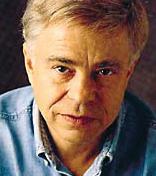

During his first stint as Rochester mayor (from 1947-’51), Claude “Boney” McQuillan, the former pro boxer and Green Bay Packer, began a sometimes quiet, sometimes overt campaign to remove racist signs (some as blatant as “No Niggers Allowed”) that adorned various Rochester businesses. Most business owners complied, but, so the story goes, one Rochester bar keeper told the mayor that the sign would stay. Boney gave him a choice: “You can take it down right now, or I will break your nose right now.” The barkeep complied.


The Talking Heads sing about the “Road to Nowhere.” We’ve found the left turn to nowhere. Southbound traffic on Broadway at Sixth Street Southwest can pull into a lane that traditionally serves as a left turn lane. However, the only place to go if you turn left is through Hazama Park and into the Zumbro River. Not a good option. It’s a puzzler, but the city traffic engineer says it’s likely a U-turn lane (though it’s not for the Broadway fire station) or a leftover from the pre-flood control days. At least once a week, we see some poor Clinic visitor with out-of-state plates, left turn signal blinking, just sitting in that turn lane.




















































In the 1968 District Three boys basketball game, Mayo beat John Marshall 61-59. Here’s what made it so amazing: Number of overtimes: 5. Number of fans (at $1.25 per ticket) in attendance at the Mayo Civic Center Auditorium: 4,100.




Number of points scored in the second, threeminute overtime: 0 (JM stalled until the final 13 seconds of the overtime.) Where longtime Post-Bulletin sportswriter Bob Brown ranked this game in the top five local sporting events of his P-B tenure (1966-2004): Third. (Second? John Marshall’s 96-66 win over Spring Valley in the Region One boys basketball semis in 1969. And number one? Pat O’Connor’s boxing win over Duane Horsman in 1969.)
Rochester’s greatest heavyweight boxer (with the most mediocre nickname)

t was, judging from the grainy black-and-white photo, a relatively standard float. Three people in costumes driving and standing on a flat-bed pickup truck draped with a banner of stars. But the costumes were KKK. The Ku Klux Klan sponsored a float in Rochester’s Fourth of July parade (back when they had a Fourth of July parade) in 1926. The truck was driven by two men in the traditional white robes and headresses, while a third Klansman stood in back waving the American flag.
Rumors of Klan activity in Rochester first appeared in 1922. On September 28, 1923, the city awoke to find copies of the KKK’s Minnesota publication, Call of the Wild, on the doorstep of every home and business in town. The next day, Rochester’s two newspapers received threatening letters in the mail, written in ink on pieces of white bed sheets.
On March 3, 1924, a series of explosions sounded on a bluff to the north of town, and people living nearby reported seeing a burning cross. In 1925, a Klan rally in Kasson attracted a crowd of 500. The main speaker had given an address the week before at Rochester’s Flag Day celebration.
But the Klan never acquired a serious following in Rochester, perhaps because minorities were not a major economic concern here. Although for a time it was able to seize political power in Indiana, Oklahoma, and Oregon, the Klan’s strong-arm tactics were not well-received in most American communities. By the end of the 1920s, it had begun to run out of steam, and while it experienced a brief resurgence during the mid-1960s, it never regained widespread popular approval. And they haven’t, as far as we could find, had a float in any Rochester parade since.

e was glamorized by Hollywood in a movie set in Iowa. And buried in Rochester.
After a long and solid minor league career, Archibald “Moonlight” Graham was finally called up by Major League Baseball’s New York Giants on June 29, 1905. With a ten-run lead over the Brooklyn Dodgers after eight innings, according to Major League Baseball, Giants manager John McGraw made a defensive change, replacing George Brown with Archie “Moonlight” Graham in right field. Three quick infield outs by the Dodgers ended the game, and Graham never got to bat. It was the only big league appearance the 28-year-old Graham would ever make.
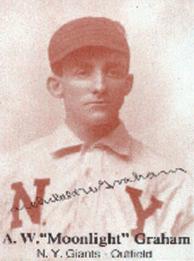
The Giants went on to defeat the Philadelphia Athletics four games to one in the 1905 World Series, but Graham, faced with a trip back to the minors, left baseball for a medical career. After graduating from Johns Hopkins, Graham took a job in Chisholm, Minnesota, arriving soon after the Great Chisholm Fire of 1908. “Doc” Graham spent his first six years practicing medicine at Chisholm’s Rood Hospital and the next 44 years as physician for the Chisholm schools, where he gained national recognition for his study of children’s blood pressure.
“A pioneer in the field of vaccinations, his concern and dedication provided Chisholmites with a town that was never quarantined because of communicable diseases,” according to the Chisholm Chamber of Commerce. “Doc Graham became a legend, a champion to the oppressed. The grand marshal of every football, basketball and baseball game, he encouraged youth to train and play. He believed in the community and the parents and children believed in him.”
It wasn’t until 1989—25 years after his death—that Graham finally got his big league at-bat. In the Kevin Costner-starring Field of Dreams, the young Archie Graham (played by Frank Whaley) hits a run- scoring sacrifice fly to right.
Earlier in the movie, character Ray Kinsella (Kevin Costner) laments that the stunted baseball career of “Moonlight” Graham (the older version, played by Burt Lancaster) could be considered a tragedy. Doc Graham, in that classic Lancaster voice, says: “Son, if I’d only got to be a doctor for five minutes, now that would have been a tragedy.”
Though he died in Chisholm in 1965, he was buried here to be next to his wife Alecia, who was born in Rochester.
Archibald “Moonlight” Graham’s grave site, often part of the annual Cemetery Walk, is located at Section 9, Lot 4, 1E of Calvary Cemetery. Above info from Baseball America.


Best interspecies kiss by a Rochester actress (or at least an actress who was born in Rochester)
Our favorite big-hair band video with a Rochester tie
Grave site most worthy of a baseball/movie pilgrimage
Best china plates stuck into the walls next to an adult book store
n 1966, Owatonna-born Don Laughlin bought an eight-room motel and bankrupt bar on a dirt road 20 miles from nowhere. Today, his 1,500room hotel/casino (Don Laughlin’s Riverside Resort) anchors a desert gambling town that draws five million annual tourists.
As a 14-year-old, Don Laughlin spent the winter of 1945 trapping mink (at $20-$40 per pelt) and bought a slot machine for $75. “I had a friend with a store in Merton [near Owatonna], and finally I put it in there,” Laughlin told us in a previous interview. “Pretty soon I was running 15 or 16 slots. I was 15 years old and making $500 a week. Then my principal called me in and said ‘Get out of the slots or get out of school.’ I told him, ‘I’m already making twice as much money as you are.’ And that was it for school.”
In 1952, Laughlin and his then-wife Betty moved to Las Vegas. Don bartended and went to dealer school at night. In 1966, he made an offer on an eight-room motel/casino and a bankrupt bar in a place without a name at the southern tip of Nevada. The post office named the place Laughlin.

orn as Julia Dempsey to Irish immigrants in New York in 1856, Sister Mary Joseph Dempsey joined the order of St. Francis in Rochester (Minn.) in 1878 at the age of 22, and was assigned to St. Marys Hospital in 1889. She took over as nursing superintendent in 1892 and served in that top position for 47 years. She served as first surgical assistant to Dr. Will Mayo for 25 years, and is credited with an important medical find: She noticed a nodule near the belly button common to patients with an advanced form of abdominal cancer. In 1928, Dr. Will published a paper documenting her findings, and, today, “a palpable nodule bulging into the umbilicus as a result of metastasis of a malignant cancer in the pelvis or abdomen” is referred to as the Sister Joseph’s Nodule.

They aren’t just fancy pictures on the walls of the Plummer Building, there are stories etched on the walls. In one scene, the building’s namesake, Dr. Henry Plummer, is seen on the corner of the building at Second Street and Second Avenue Southwest. He’s poring over plans for the building with a wise owl at his knee. On the south side of the building are two limestone reliefs showing the 1928 presidential election outcome. The Republican, Herbert Hoover—the winner—is depicted by a triumphant elephant, while the Democratic candidate, Al Smith—the loser—is depicted by a droopy-eared donkey with its tail between its legs.

At the front steps of Residences of Old City Hall, on the south side, is a bronze monument marker for surveyors—the original surveyor starting point for the city of Rochester.







tto Haling was a born tinkerer. As a class project in machine shop at Rochester High School in 1918, he built a full-sized tractor, which his father used for the next ten years on the family farm just north of the city (where the Valhalla and Elton Hills East subdivisions are today). Later, he opened a small machine shop in the Rochester Chick Hatchery on First Avenue Southeast, across the street from his home.
Around 1933 Haling designed a steel ventilated piston ring, which made the pistons in engines move more smoothly and cut the use of oil by more than half. Bending the thin Swedish steel bars for each ring was time consuming, so Haling invented a machine that made the bars into steel coils. Now he could produce upwards of 20,000 identically-shaped rings in a day. Because the coils were simply a way of making it easier to form the piston rings, he didn’t bother to patent them.

In 1943, a naval engineer named Richard James, while experimenting with one of Haling’s steel coils, dropped one on the floor, where it began to “walk.” Fascinated, James took the spring home to show his wife, Betty. “I think I can make a toy out of this,” he told her. Two years later, he patented the “walking” spring, which his wife had christened the Slinky. Exhibited at Gimbel’s Department Store in Philadelphia during the 1945 Christmas season, the Slinky was an instant success (and sold 100 million units in the first 10 years). Two hundred and fifty million Slinkys later, James Industries is still making and selling Slinkys, but since Haling’s steel coils were not protected by patent, he could only sigh and wish he’d seen their whimsical potential himself.
But Haling was more interested in the inventive process than in patenting his ideas. By the time he died in December 1991, he had developed over 100 inventions, including a boring machine to make compression piston rings and valve seats that made gasoline motors work more efficiently. He sold his piston rings—and other machine parts—all over the world. Every so often, he would come across one of his inventions being marketed in the trade catalogs under someone else’s trademark. Including the Slinky.
Oakwood Cemetery is the cemetery that holds many of the city’s famous names on its markers, including the Mayo family. The cemetery also notes the many people who’ve donated their bodies to science.
Mayo Foundation has placed three sizable memorials at Oakwood Cemetery that acknowledges the people who’ve donated their bodies to benefit science.

The newest two are just to the west of the ornate gate at Oakwood, marking the years 1985 and 2000 and noting “Dedicated to the individuals who have donated their bodies to Mayo Foundation for anatomical study so that others might live.” Another memorial marker for 1917 to 1985 is in the northeast section of the cemetery.
In late April of 2004, landowner (and retired Mayo Clinic neurologist) Don Layton discovered—or at least rediscovered—a 150-foot-long, 30-foot-wide, 50-foot-deep cavern in rural northeast Rochester. When Layton crawled into the cave’s three-foot opening for a quick exploration, he found, among the soda straw stalactites (the ones from the top down) and flowstone formations, sandstone walls scratched with initials and other semi-modern graffiti. Near the cave’s furthest and deepest point, though, Layton discovered a few simple and apparently much older carvings—one in the shape of a leaf and the other like a turkey’s footprint. Some of the archaeologists who have since toured the cave believe these carvings are Native American symbols associated with fertility and spirituality (one of the leaf etchings has been described as “vulva like”), leading the scientists to believe the cave might have been used for ceremonial purposes. The now-named Hadley Valley Cave has been temporarily sealed and is, for safety’s sake, currently inaccessible to the public.

In 1933, Dr. Will Mayo created a medical display for the Chicago World’s Fair. The display was centerpieced by the 6-foot-tall “Transparent Man” (see below).
In 1935, the items were put on permanent display as the “Museum of Hygiene and Medicine” in downtown’s old Central Junior High School building. The name was later changed to the Mayo Medical Museum.
In its 55 years, the museum drew over 5 million visitors to the free exhibit, which included an old iron lung (the size of a small submarine), the World War Two pressurized fighter pilot suits developed at Mayo, amputated limbs preserved in large glass jars, a collection of swallowed objects (coins, needles, etc.), and full-sized dioramas depicting things like farm accidents (including “Man with Pitchfork in Foot”).
In 1988, the museum, which had been relocated to the first floor of the soon-to-bedemolished Damon Parkade, was closed for good. Most of the displays were put in storage. The Transparent Man, eventually, found his way into the Patient Education Center, in the subway level of the Siebens Building, where he still stands today.
Created in Dresden, Germany, in 1933, the 6-foot Transparent Man centerpieced Mayo Clinic’s medical display for the 1933 Chicago World’s Fair.
It was one of the earliest examples of life-sized, see-through people (in which various organs lit up to accompany a recorded scientific message) and, even today, one of the few transparent men still in existence. (Women, with their non-protruding reproductive organs and pregnancy subplot, were far more popular. Though there are only a few dozen transparent women displayed in the United States.)
Two years later, the Transparent Man, arms raised like he just won Wimbledon, stood in the Mayo Medical Museum—originally dubbed the “Museum of Hygiene and Medicine”— which opened in downtown’s old Central Junior High School building (see above).
After the museum closed in 1988, The Transparent Man, eventually, found his way into the Patient Education Center, in the subway level of the Siebens Building, where he greets visitors making their way into the center to reference medical books or magazines or self-test their blood pressure.

The nearest Transparent Woman, actually women—female twins—are on display in the Fort Crawford Medical Museum in Prairie du Chien, Wis.
for “a few days of rest and shoulder massage treatments,” legendary golfer Byron Nelson stopped in for 18 holes at the Rochester Golf and Country Club.
The game’s “greatest gentleman,” Nelson had won Masters (1937, ‘42), PGA (1940,45) and U.S. Open championships (1939) and was carrying a nine-tournament PGA winning streak (which would eventually reach 11).

In front of 1,000 fans, the 33-year-old Nelson, who had been offered a $100 War Bond if he could break the RG&CC course record, teed off with touring professional Harold “Jug”
McSpaden and two locals—RG&CC Pro Wilson Crain and Soldiers Field Pro Herb Thienell.
Eighteen holes later, the scorecard read: McSpaden, 74, Crain, 75, and Thienell, 87. Nelson walked off the course with a then-record 66.
Fields—later of the Turkey River All Stars fame—shot a 1-under-par round of 70 at RG&CC. Which is pretty good, especially for a 54-year-old. Fields, though, carried just three clubs: a 4-wood, a 6-iron and his putter.
Rochester museum in which you would have been most likely to see a “collection of swallowed objects”
Sunday, October 11, 2009 – 2:00 pm

Zumbro Lutheran Church
Saturday, November 7, 2009 – 8:00 pm
Founder’s Dinner – 6:00 pm
Friday, December 11 and Saturday, December 12, 2009 – 8:00 pm
Lourdes Chapel at Assisi Heights
Sunday, December 13, 2009 – 4:00 pm
The Church of St. John the Evangelist
CAE and VocalEssence
(Philip Brunelle, conductor)

Saturday, January 9, 2010 – 8:00 pm
Lourdes Chapel at Assisi Heights
Saturday,March 6, 2010 – 8:00 pm
Zumbro Lutheran Church
Sunday, March 7, 2010 – 2:00 pm
Mt. Olive Lutheran Church
Saturday,May 8, 2010 – 8:00 pm
Lourdes Chapel at Assisi Heights
 110 1st Avenue SW – Rochester 252-8119 1 blk east of Mayo Clinic, across from the Marriott.
110 1st Avenue SW – Rochester 252-8119 1 blk east of Mayo Clinic, across from the Marriott.


Formerly Rochester Junior College—started in 1915 on a motion by Dr. Charles Mayo—RCTC is the oldest community college in Minnesota. Classes were originally held in Rochester High School, with 17 students in RCTC’s first year. In 1923 the college’s enrollment topped 100, and from there the rest is history. Rochester Community and Technical College (RCTC)—which became the name of the college in 1996—now serves almost 6,000 students yearly. Best known for its health-related programs, the largest programs offered are Liberal Arts, Nursing, Business, Digital Arts, and Law Enforcement. Enrollment for the fall semester is up, as RCTC offers a cost-effective, high-quality education that is valued especially during hard economic times.
“Most RCTC students reside in the 10-county area [around Rochester] with the largest concentration in Olmsted County,” says Michelle Messenger, director of marketing. “Approximately 10 percent of RCTC students reside outside of Minnesota. International students attending RCTC originate from more than 30 different countries around the world.”
Students from more than 40 different high schools in the area enroll in RCTC’s Post Secondary Enrollment Options program. PSEO gives high school students the opportunity to take full- or part-time courses at RCTC for high school credit as well as college credit. Most of the students enrolled start classes at RCTC after 10th grade and participate in the program until they graduate from high school. Tuition, fees and required textbooks are provided at no cost to the students.
RCTC has a multitude of student clubs and organizations. Students can join college athletic teams, intramural sports, student government, music, theater, and the student newspaper, to name a few of the more than 20 student groups. In addition, RCTC has partnered with Winona State University’s Rochester campus in a program called “Path to Purple,” allowing students enrolled at RCTC to start on a path that will lead to an easy transfer to Winona’s Rochester programs and add a bachelor’s degree.

Cardinal Stritch University was started in Milwaukee by the Sisters of St. Francis of Assisi. It was originally called St. Clare College, but the college was renamed nine years later in 1946 for Samuel Cardinal Stritch, a former archbishop of Milwaukee and a friend of the sisters. Although the university has grown to multiple locations throughout Wisconsin and Minnesota to become Wisconsin’s second-largest independent university, the founding Franciscan values remain a part of the programs today.
“Regardless of your focus, ours is to help you transform your life, through value-centered education,” according to Stritch’s online Admissions Statement. “It's our purpose. It's our mission. Admission to Stritch opens the door to knowledge. And to lifelong connections.”
The Minnesota locations of Cardinal Stritch, including Rochester, offer adult higher education programs such as graduate degrees in Business Administration or Science in Management, undergraduate degrees in the science field, or certificate programs in management. Rochester’s Cardinal Stritch now also offers a Bachelor of Science in Nursing completion program, as well.
Tim Elliott of the Minnesota Stritch enrollment team says, “The convenience of taking classes close to home, one night per week, allows students to fit school in with their busy lives.”


Celebrating 10 years in Rochester, Augsburg offers undergraduate degrees, education licensure options, a nursing bachelor’s completion program, and graduate degrees in education, business, and nursing in a setting meant for busy, working adults. The Augsburg College website declares that “Auggies (Augsburg students) are lifelong learners,” so it should come as no surprise that the college strives to make learning possible at any age.
An offshoot of the downtown Minneapolis main campus, the Rochester Augsburg branch strives to meet the needs of the city. Director Karl Wolfe says, “We have just added the communication major and continue to look at other degree programs that can best serve the Rochester and greater southeastern Minnesota area.”
The College of St. Scholastica’s Rochester Campus–Bachelor degree programs for working adults.





- Liberal Arts Education

- Evening Classes
- Year-round Enrollment



- Accelerated Format Call









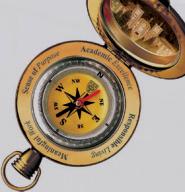

Accelerated learning and flexible scheduling make it possible for you to work full time and attend classes.

It's hard to believe that above the noisy shops, restaurants, and skyways in downtown Rochester, there’s a student lounge where dedicated learners are deep in concentration. With one escalator ride to the third or fourth floor of University Square (formerly the Galleria), suddenly one arrives on a college campus.
300 University Square (the street address is 111 South Broadway) is the current home of UMR, and “the location of the campus is ideal,” says Sarah Kelling, director of communications and public relations. “It allows us to connect with our partners, including the Mayo Clinic, retail shops, and the Y” (which offers recreation opportunities for students), Kelling says. UMR is developing other partnerships as well, and the downtown location is key. “It allows our students to interact on a daily basis with professionals at one of the world's most well-renowned medical facilities.”
While the location is not slated to change, it is set to expand and grow. Marilyn D. Stewart, chair of the Rochester Higher Education Development Committee, says, “A permanent UMR campus will nurture, emphasize, and contribute to the assets of the community without harming its great resources .... and will continue to enhance the economic development of Southeast Minnesota.”
Plans for future growth were approved by the University of Minnesota Board of Regents in February and will unfold in coming years. All additional campus space will remain within six blocks of Rochester’s downtown area and create a contiguous campus core to house academics and activities.
Providing higher education opportunities in Rochester since 1966, UMR offers more than 30 graduate and undergraduate degree programs through partnerships with the U of M’s Twin Cities and Duluth campuses. This fall the university will begin offering its own baccalaureate degree program, the bachelor of science in Health Sciences. According to the website, unique features of the program include an integrated curriculum that focuses on health sciences and flexibility to explore career options.
In addition, UMR offers baccalaureate programs from the School

of Nursing, the Academic Health Center, and the College of Continuing Education. These programs offer traditional and nontraditional students the opportunity to learn from University of Minnesota faculty and earn their University of Minnesota degree without having to travel to the Twin Cities.
The student lounge and classrooms in University Square are not the only places for UMR students to get together. Gopher Holes are held throughout the year, an opportunity for Gophers (UMR students) to get together and unwind, eat, and have fun with fellow students. Past events have included karaoke, poker night, job interviewing skills, and money tips for college students. Connecting socially and academically can also happen in UMRaffiliated housing, which is within walking distance of campus. This housing offers students the typical college experience with the amenities that are important to college students.

The Minnesota School of Business of Rochester opened in 2005, adding Rochester to six sites in the Twin Cities and St. Cloud that offer their programing. Students at MSB-Rochester Campus, which is partnered with Globe University, bring a wide range of experiences to the classroom.

First-time college students and working professionals share a common goal of career preparation, which instructors help them achieve in their respective fields. MSB-Rochester offers bachelor’s, associate, and diploma programs in health sciences, business, legal sciences, information technology, and interactive media and graphic design.
Faculty and students at MSB-Rochester/Globe College work closely with the professional community of Rochester. “As a career college we continue to work with employers and the community to meet their needs, allowing our students the greatest opportunities upon graduation,” says Shan Pollitt, campus director. “By staying in contact with the employers we can adapt programs and curriculum to meet their needs.”
Saint Mary’s University-Rochester Center is part of Saint Mary’s University's schools of graduate and professional programs and is one of the largest graduate schools in Minnesota. Founded in 1912 in Winona by Bishop Patrick R. Heffron, Saint Mary’s is a private, Catholic, comprehensive institution. St. Mary’s of Rochester shares in a partnership with RCTC that allows students to transfer credits between the two institutions easily.
Faculty from St. Mary’s in Winona travel to make the Rochester program a success. “Our faculty in all programs except the doctoral program are adjunct,” says Laurie Roy, Rochester Center Coordinator. “Our instructors are highly qualified professionals in their field, and they bring practical and valuable insight into the classroom.”
Southeast Technical has a wide variety of studies available, in fields ranging from Accounting to Auto Body Collision Repair to Cosmetology to Criminal Justice. Some of the more unique offerings fall into the music industry: programs in band instrument repair, violin repair, and guitar repair and construction are unique and draw students from around the country.
The violin repair program—in which students learn about tools, wood, trees, and basic maintenance and repair techniques for the whole string family—is the only stand-alone program of its kind in the country. Fine motor skills, patience and the ability to focus on the work at hand are essential. The aim of the program is for students to be prepared to work in the best violin shops in the world and to continue the lifelong process of learning the art. In recent years, the program has achieved 100 percent job placement for those earning violin repair diplomas.






Although Rochester has been home to Crossroads College for the last 38 of the school’s 59 years (it settled in to a new 38-acre campus in Rochester in 1971), the school has roots in Minneapolis as well as a history of other names (such as Minnesota Bible College).

Unlike most of the other higher education options in Rochester, Crossroads offers a residential campus with housing for single students and families. Unique “townhouse” style housing—with five to six bedrooms, two to three baths and communal living and kitchen areas—are furnished by the college and offer students a community setting.
The Crossroads student council plans several activities throughout the year that are open for the entire student body. Past activities have included softball and volleyball games, campus-wide games of capture the flag, campfires, banquets, bowling, winter sports such as broomball and sledding, and many more. The school aims to be Christ-centered and prepare students for lives of leadership in their local and church communities.
“What makes life at Crossroads so fun is the love we share for Christ and for each other,” says senior Music Ministry major Polly Blanshan. ”Out of this joy of sharing life together comes a spontaneous time of worship in a townhouse living room, a moment sharing a donut and conversation in the admissions office, a joke with President Kilgallin, and a hacky-sack game in the parking lot with your favorite professor.”
Blanshan, who spent her first two years at Crossroads in their Post Secondary Education program (PSEO), describes Crossroads as a college of “love and unity.” The highlight of student life for her is the
relationships she has formed with both students and faculty. “It is great to live life with fellow students who are learning and growing alongside of me, encouraging me, and doing it all for the glory of God. The relationships I have with the staff and faculty are also invaluable. They care about me both academically and personally, always willing to counsel, console, listen, and encourage.”
Mayo School of Health Sciences is a small school within a large organization, says Jodi Nelsen, a recruiter for the school. The school formally began in 1973 with fewer than 10 programs; since then more than 5,500 students have passed through its courses. “Students benefit from small class sizes, but at the same time benefit from the world-class, world-renowned facilities of the Mayo Clinic,” Nelsen says.
The school’s largest programs are Physical Therapy, Nurse Anesthesia, Radiography, and Clinical Laboratory Sciences. “At Mayo, students experience the worldfamous clinical care experience, world-renowned faculty and mentors, world-class clinical and research resources and interact with a worldwide patient population,” says Nelsen. “Our programs prepare students to enter specialty careers in healthcare.”
The relationship between the working Mayo professionals who teach courses and the students is a dynamic one, according to Nelsen. Students appreciate having preceptors (an expert or specialist, such as a physician or a nurse, who gives practical experience and training to a student) for guidance and support through the rigorous programs.

St. Scholastica was founded in 1912 by a group of Benedictine Sisters offering courses to six young women in Duluth. Besides maintaining its main campus in Duluth, the school now offers programs for higher education in Brainerd, St. Paul, St. Cloud, and Rochester.
“All of the extended campus locations, including Rochester, provide students an opportunity to really become part of the St. Scholastica community with its supportive learning environment,” says Susan Zarambo, assistant marketing coordinator at St. Scholastica.
Undergraduate studies available in Rochester include management, organizational behavior, and an RN to BSN degree completion program (bachelor of nursing). Online studies offer even more options including graduate degrees and online certificates and licensures.
The accelerated degree evening program offers classes six times per year instead of the traditional two-semester system. Courses are offered in eightweek terms with each class meeting one night per week from 5:30 to 9:30 p.m.; for more flexibility some classes are also offered online. Full-time students take two classes per term.

Bethel’s MBA program offers busy, in-career adults a “hybrid model of learning” that combines face-to-face class settings with online sessions. Student Eliseo Garcia appreciates the one-weekend-per-month schedule that the program offers along with a structured timeline of online work: “This schedule works better for me than having to sit in a classroom one day per week.”
Rochester Bethel students become a support group for one another and progress through the entire program together, which typically takes 24 to 26 months to complete (with a short break during the summer).
“We want to continue to grow and accommodate the needs of adult learners,” says Michael Price, director of admissions. “Our newest initiatives will be moving to online programs.” Price says that Bethel’s distinguishing characteristic is faith integration. “We do value this and understand the importance of ethics and character in the workplace.”
“As a working adult with a family, the night business program is about as convenient as it gets,” says WSU-Rochester Center student and working professional Tyler Pronk. “The staff at WSU-Rochester is professional and personable. They have helped me tremendously so far in my student career.” Pronk is one of roughly 1,000 students who attend classes at Winona State University’s Rochester Center. With more than 20 undergraduate, graduate, and certificate programs available, WSU-Rochester Center is sure to have something available for any working professional.
WSU-Rochester Center has a growing partnership with RCTC, says Pete Myszkowski, WSU-Rochester Center enrollment communication coordinator. Two initiatives will make that bond even stronger: A new UCR Welcome Center is in the works to better serve prospective students entering RCTC and WSU-R programs. Also, the “Path to Purple” initiative will help students from RCTC in a one-year program that will lead to admission at WSU-Rochester Center.
Sylvan understands the pressure and challenges students face in making the most of their college entrance exams. Sylvan’s ACT® prep course can reduce your stress and increase your score.
Real results - 3 out of 4 Sylvan students increase their ACT score by 5 points*
Individualized instruction
Twenty-eight lecture hours focused on the exact skills you need
Two timed practice tests
Expert instructors know the test and understand the challenges of preparing for college


Don’t wait! Courses fill up quickly.
This special section in our January issue will have fun-filled, creative information for the happy couple, their attendants, family, friends and even their guests! Here is your chance to tell them about your rehearsal dinner space, engaging djs, photography services, great gifts, wedding attire, hotel offerings and more. Ad space reservations accepted through Nov 25th.
To advertise in the Wedding Book, contact Kristy Mintz kmintz@rochestermagazine.com

507-281-7469
Mayo Clinic is seeking women and men, between the ages of 18 and 80, for a clinical research study. The purpose of this study is to learn more about hormones as we age and how they affect the pituitary “master” gland, bone density, muscle weakness, and body fat.
Studies involve several daytime or overnight visits to the Clinical Research Unit at Saint Marys Hospital. There will also be screening blood tests and a brief physical exam. You will be compensated for your time in the study.
For more information, please contact us at (507) 255-1290 or endoresearch@mayo.edu
More clinical trials information can be found at http://clinicaltrials.mayo.edu
Mayo Clinic is an affirmative action and equal opportunity educator and employer.
After all, the two stylish stay-at-home moms and good friends both loved fashion and knew how to sew. Their initial creations drew so many “I love your belt. Where’d you get it?” compliments that the Edina duo soon had production requests from friends and family. Williams and Hatch tweaked the concept of those inspirational striped and alligator laden ribbon belts by crafting theirs in a wider variety of fabrics, to suit every style from classic to contemporary, and, with true mom sensibility, also made some styles reversible.

Williams and Hatch were happily busy being moms and making a few belts when a chance conversation with another neighbor changed everything. Megan Tamte, days away from opening the flagship store of her now highly successful Hot Mama franchise, chatted with Cathy about her creative belts, then simultaneously panicked at the realization that the key accessory was the one thing she’d neglected buying for the store. She immediately placed a large order, including a display fixture whipped up by Cathy’s husband. Hot Mama was an immediate hit, as were the belts, and suddenly Cathy and Darcy’s joint venture landed smack on fashion’s radar.
The partners named their rapidly growing business after two of Cathy’s favorite women and role models: great grandmothers Elin and Clara. “Elin was the quintessential mom and Clara was vibrant and colorful,” Cathy relates. “It just felt like together they captured the spirit of our designs.” With their creative vision intact, it was off to the L.A. textile shows to meet with global vendors. When they fell in love with beautifully patterned and textured fabrics from mills in India and Italy, Cathy and Darcy opted to expand the elin & clara line into wonderfully un-fussy, versatile scarves and playful hats.
“Our business really catapulted,” said Cathy via cell phone, when the busy entrepreneur (and 1990 Mayo High School grad) took a quick break from running with the kids. “The elin & clara line is
currently in over 50 boutiques in 16 states and we have an active website and e-store.” Cathy and Darcy also host in-home trunk shows by request. As a bonus to their legions of loyal customers, the duo buys some of their favorite things at trade shows and offers them online. “This summer we found this great all-purpose bag at a wonderfully low price point. We loved them and thought all our friends and customers would too,” she explained. Next up, the ladies launch their fall and holiday lines filled with subtle suedes, versatile tweeds, luxurious velvets, and glitzy rhinestone buckles. Down the road, when their combined six children are a bit older, they hope to expand the line to include fabric jewelry as well as clothing.



















An estimated 1,200 people filled McMurphy’s Sports Bar/Aquarius Night Club for the twelfth Shjon Podein Children’s Foundation Celebrity Party on June 28. Among the attendees were 120 celebrities, including Olympic figure skater Kristi Yamaguchi, country music star Brad Paisley and multiple sports celebrities including the evening’s host, National Hockey League veteran (and Rochester native) Shjon Podein.











The evening included food, silent and live auctions, and a concert by Minneapolis recording artist gb leighton, with several special guest performances.

Last year the party raised more than $230,000 for the foundation (also known as Team 25), which was started in 1997 by Podein and his wife Sherry. The foundation strives to create an environment of caring and community support for children facing extraordinary difficulties in their lives—especially for hundreds of children in the country who have ataxia-telangiectasia (A-T), a rare neurogenerative disease that causes severe disability. One-third of all the money raised by the foundation goes toward the research of A-T and the search for a cure.
In total, Podein’s foundation has contributed more than $1.1 million to programs that support children over the past 11 years.
For more info on Podein’s Foundation go to www.team25.com.









Sunscreen and hats came in handy this summer for the 81 shavees who got major haircuts on May 16 at Whistle Binkies on the Lake. The new ’dos came during a shaving party to benefit the St. Baldrick’s Foundation, an organization which raises awareness and funds for kids with cancer. According to organizer Corey Iqbal, “This [event] is fun because shaving one’s head is a wild, impulsive notion and having a large group of people doing this at once for such a great cause generates an incredible amount of energy, optimism, and hope.”








Along with energy, optimism, and hope, the Rochester St. Baldrick’s party raised $31,427. And with 81 participants, the Rochester shave-a-thon became the largest St. Baldrick’s Foundation event in Minnesota. Celebrities Shjon Podein (NHL veteran) and Travis ‘Diesel’ Wiuff (mixed martial arts professional) joined in the fun and partook in the head shaving. The event also included live music, food donated by host Whistle Binkies, and a children’s area.
“The simple act of shaving one’s head in this gesture of solidarity, especially for young cancer patients, is very powerful,” says Iqbal. “It is best represented by the smiles on those kids’ faces that attend the event every year.”

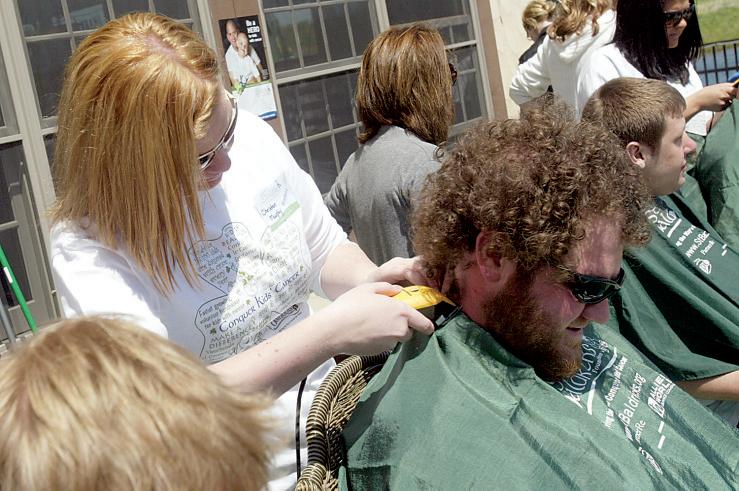
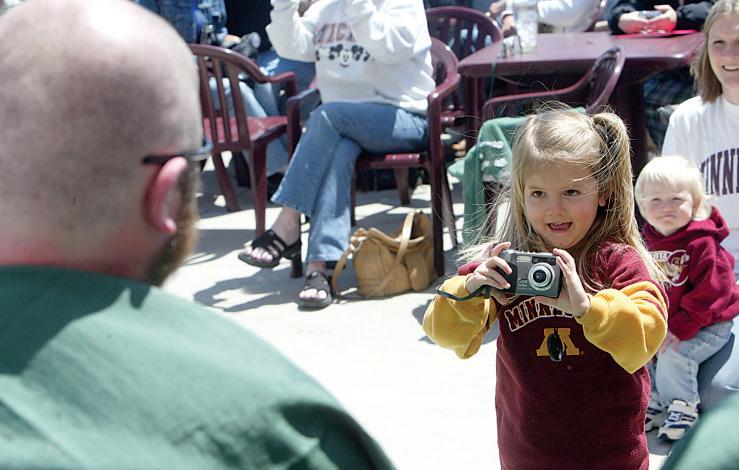
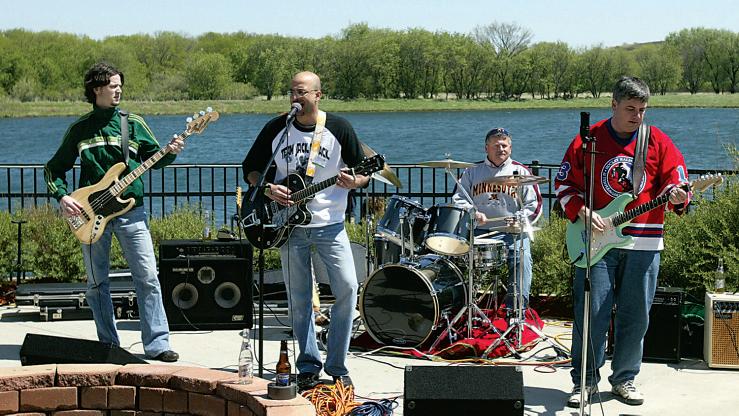


More than 130 women gathered in classic ’80s prom splendor—ruffly dresses, blue eye shadow, and mammoth hair—to “Boogie for a Cure” at Willow Creek Golf Club on May 1.









The event, which raised more than $2,000 for the American Cancer Society’s Relay for Life, attracted women of all ages and fashion leanings. “Each time the door opened and more women came in, it was a new, more outrageous dress or hair,” says Lisa Fink, who organized the event with her friend Jennifer Koski. “There were ’80s letter jackets, wrist corsages, and ‘bad girl’ Madonna themes. ”

The event included an ’80s fashion parade, pampering stations, and prom photos. Guests played ’80s trivia, danced to the hits of the ’80s (Michael Jackson, anyone?), and crowned a prom queen.










From the authentic, character-filled storefronts on Historic 3rd Street to the sleek and modern Shops at University Square, shopping downtown has so much to offer. CHERI’S BOUTIQUE (507.208.4220) is home to the interchangeable Miche bag, in addition to fabulous jewelry, home décor, garden items and children and pet gifts. Just down the block, REFASHION - Consigned Furniture & Clothing (507.281.0808), offers fashions and furnishings from some of the finest homes in the area. You never know what treasures you’ll find. Stop in at SÖNTÉS (507.292.1628) for tapas and over 40 wines by the glass (after 4 pm). A few doors down at ARTISTIC FRAMERS (507.281.4890) you’ll find custom framing plus an extensive collection of fine art, seasonal décor and gift items. Need a fresh look? ABOUT FACE (507.292.0922) offers complementary mini-makeovers and a chance to browse your favorites from Nars, Smashbox, Bare Escentuals and more. At SOPRA SOTTO (507.252.5522) in the Shops at University Square, you will find a delightful collection of all things Italian, from hand-blown glassware and table linen, to imported olive oil and freshly steamed espresso. Come visit us.






 Cheri's Boutique
Artistic Framers
Söntés
Refashion
Sopra Sotto
Cheri's Boutique
Artistic Framers
Söntés
Refashion
Sopra Sotto



























MN’s 1st Dairy Queen

D.Q. ice cream cakes
Open April through September

538 North Broadway
Furnishings, Antiques & Home
Décor Boutique
714 North Broadway
507.288.8800
Consignment, Plus Size Apparel
Home Decor & Collectibles
1516 North Broadway
507.206.3173
Avalon Music Inc. Musical Instruments, Sound Equipment and Lessons
History & Music in the Making
301 North Broadway
507.288.6311
Waynes Fine Jewelry
Design & Repair Studio
521 North Broadway
507.287.6894
Kismet
Consignment, Fashion, Furniture, Antiques
600 Block North Broadway
507.252.9717
kismetconsignment.blogspot.com
Christian Book & Gift Shop
815 North Broadway
Mon-Fri 9:00-8:00
507.289.2590
ThinkGlobally, Shop Locally. What a line up our local shop keepers have in store for us this September. With vintage inspired travel gear, gems from across the globe, Japanese inspired collectables, hand-crafted bowls from Sweden and clothing and accessories to take you anywhere you want to go.
Vintage Hotel Travel pieces



Rolling carry-on bag in lightweight nylon. (19” x 15” x 5”) $145

Coordinating fold-over tote with shoulder strap & pocket. (13” x 15”) $65
Skyway Level, University Square Downtown Rochester. Open Daily. 507.282.4142 www.collectionsfashions.com
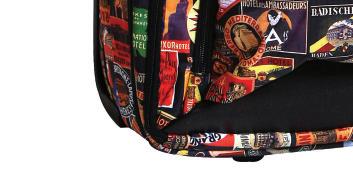
Contrast Lime bowls by Kosta Boda of Sweden. Hand blown heavy crystal in gorgeous colors. 9”x 5” bowl $85. 6” x 3” bowl $60 Skyway Level, The Shops at University Square Downtown Rochester


Open daily 507.285.9143 www.thenordicshop.net
“Global Treasures”a wonderful collection of 33 natural beads from 33 different countries including Argonite from Spain, Carnelian from Romania, and Jade from China $75.

“Global Pleasures”- Inspired by “Treasures” but a bit more posh with Sapphires, Rubies and Lapiz Lazuli among the gems from 44 glittering destinations around the world $200.

They make the perfect “Thank you”, “Thinking of you wherever life takes you” or “Happy Unbirthday” to you (yes, you) gifts.
“Treasures” at Artistic Framers-Historic 3rd St. SW. “ Pleasures” at Tableside Manor-Marriot Hotel Lobby. By appointment 507.285.0012. janinejewelrydesign@gmail.com
Kimmidolls – to collect or share.

Based on traditional Japanese Kokeshi Dolls. Originally handcrafted to be given as tokens of love and friendship, these delightful little dolls make perfect gifts and collectables. Each one is unique and has an individual meaning expressing one of life’s true values. Unity, peace, wisdom, and more.



Large Doll $16.99. Small Doll $9.99. Keychain $8.99 2950 41st Street NW (by Target North) 507.252.5000
Beads & Jewelry



Imagine it. Create it. Wear it.
“Wound Around” Bangles
Available for purchase, or make your own!. Classes start at $20 plus cost of supplies. 20 Third Street SW – 507.288.2258


www.nordicgypsy.com
Unique Clothing & Accessories









Samuel Dong - Violet Stretch Jacket $108




Brighton - “Cher” Zip Wallet $119

Brighton - “Whirl” Necklace $52
Skyway Level, University Square – 507.281.5585
Kahler Grand Hotel/Peace Plaza – 507.281-2284
The rumor is that McDonald’s Shamrock shakes are just vanilla shakes colored green, but that people just believe that they have a minty taste.
Oh no. They put mint in them. I can vouch for that. They’re legitimate.
PH [laughing]: The pay is great.
PH: We don’t see it that way. It’s just our duty.
PH: Yes.
PH: Do you remember the commercial where the guys jumped over the front counter? Some of those old ones I think they should bring back.
PH: Ronald McDonald has gone through some stages. There was a time when they just pulled him back and let it cool for a while, when some of the teenagers weren’t accepting them in the proper manner. I don’t think they push them as much as they did at one time.
PH: The Ronald McDonald clown in the Milwaukee area was a trainer for years, and these guys are very well trained. When I was supervising McDonald’s in Kenosha, Wis., he came to town and we took him to one of the hospitals. There was a little girl there who had been in an accident and was in a trauma situation and hadn’t talked for two weeks. Within five minutes he got her to talk, and I never forgot that.
PH: It’s been my contention that Rochester has treated me very well, and it’s a two-way street as far as I’m concerned. I just feel I have an obligation to give back to the community.
PH: The Library Foundation board. Not the Library Board. I’m not smart enough to be on the Library Board. Our focus is to raise funds to help the library ... I rank the library with the police department and fire department. I think they’re on a parallel course in that they’re necessary for the health of the community.
PH: You know, that has been one of the most difficult things for McDonald’s. As you well know, it has a worldwide reputation for French fries. They had to be very careful.
PH: I have. I have never in all the years I’ve been in business made a derogatory remark about a competitor. One of the most outstanding things that happened to me was in 1978, when we had the flood in Rochester. The next morning I came down to the Broadway store in a truck— the water was still so high. The first person to come to my back door was the supervisor from the Burger King restaurants to ask me what he could do to help me. A pretty classy act.



PH: Look at this aspect of it, Steve. It gets most of its support from Rochester people. But nobody in Rochester ever stays there. Think about that.
PH: In September I’m going to Chicago for four days for a reunion of my ship, the Uhlmann [a destroyer]. We went through seven typhoons in the Pacific. I never got sick once.
PH: No, I can say the ribeye steak at Michaels.
PH: Mercury. I’m a chemical engineer. I better know that.
PH: White, white, white, white, white.
PH: Water.
PH: No I didn’t.
PH [laughing]: No I didn’t.
PH: Yes. French fries.






